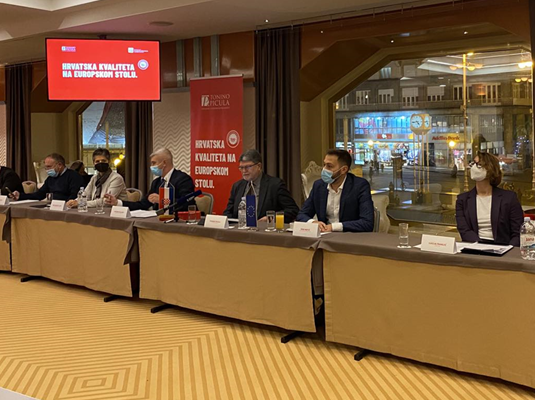"We are entering the dialogue with the Italians about the protection of prosecco with a cool head, well-informed and with strong arguments. The debate is welcome, but I believe that the "victory" will bring arguments, not an emotionally charged collection of cheap political points. From every debate, every dispute, it is possible to come out without a bitter taste in your mouth - I hope we will come out with a taste of Prosecco on ours", said today Tonino Picula, Croatian Member of the European Parliament at a round table entitled Croatian Tradition at the European Table.
The round table on the protection of original products in the European Union was organised by the Zagreb office of MP Picula, and was attended by Mr. Tugomir Majdak, State Secretary at the Ministry of Agriculture of the Republic of Croatia, prof.dr. Edi Maletić from the Faculty of Agriculture, University of Zagreb, Mr. Leo Gracin, President of the Association Vino Dalmacije, Ms. Ana Marušić Lisac, director of the Biotechnicon Entrepreneurship Center and Mrs. Lucija Franjić, a lawyer specialising in intellectual property.
"Exactly one month ago, in the Committee on Agriculture of the European Parliament, we held a hearing of Mr. Michaela Scannelle from the General Directorate of the European Commission for Agriculture, which is also responsible for designations of origin, and thus for resolving disputes. Prosecco was a special topic. Despite Italian arguments, the Commission has taken a clear and unequivocal position that Prosecco and Prosecco are two different products, different colours, fragrances, packaging and prices, different traditions and customs of consumption, and finally, two products on the shelves of retail chains and restaurant menus are located in significantly different places. In other words, a month ago, the Commission made it public that it believes that the chances of misleading customers on the issue of Prosek and Prosecco are minimal, i.e. negligible", Picula reminded during the discussions.
State Secretary Majdak reminded that the Ministry of Agriculture has established the Prošek Council, which will prepare all necessary support to answer questions that may arise in it as producers and all experts who help in the process of protecting the EU average, and that Croatia has professional, historical and legal arguments to protect prosecco. At the end of the process, to which Majdak added that he believes it will be successful, prosecco producers will have the right to use funds from the rural development measure by obtaining protection.
"We have enough arguments that it is pointless to argue about the average. We experts cannot understand how someone could replace these products and how they could influence their marketing. In this case, the question of age is also important, given that the method of production of drying, the so-called passito method, dates from the 16th century, in contrast to the average that in Italy accounts for 66% of all wines produced and dates from the 19th century. Ana Marušić Lisac emphasised the importance of building customer confidence in the market and establishing a clear way of bringing products closer to consumers on Croatian and European shelves. She also stressed the need for control and education of professional staff in certification bodies in order to achieve the credibility of standardised control procedures.
Intellectual property lawyer Lucija Franjić pointed out that two homonyms can exist on the market, and that phonetic similarity and conceptual similarity are not enough arguments of the Italian side to ban prosecco protection, as it is provided throughout the European Union, and that consumers should be taught on oenological differences. "Respect for tradition has prompted us to make a new specification, significantly tightened in 2013, with the intention of creating a serious Croatian brand. It is not possible to add the adjective Dalmatian and change the name, and it is a big mistake of the Italians to start a conflict with Croatia. Although they have strong marketing around the average, about 2 billion euros, a good part of Italian winemakers understand the fallacy and justifiably stay on our side ", said Leo Gracin, president of the association Vino Dalmacije.
At the end of the discussion, Picula invited the gathered to come tomorrow for an organized blind tasting of prosecco and prosecco and tasting of protected Croatian food products, which will be held from 10:30 to 14 hours in Zagreb's Petar Preradović Square.


